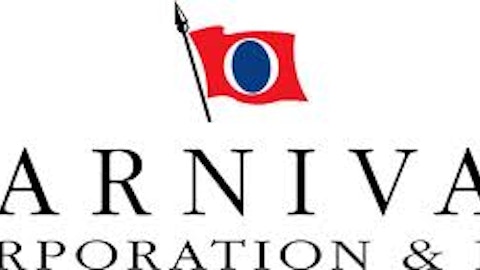Carnival Corporation (NYSE:CCL), the world’s largest cruise operator, recently announced a restructuring plan which involves splitting the roles of the CEO and the Chairman. Micky Arison, whose father founded the company in 1972, relinquished his role as the CEO, with Arnold Donald taking up the position. Nonetheless, Arison is expected to remain a key figure in the company’s leadership, and will certainly be involved in making some key decisions. Since the company reported FQ2, 2013 results, a rebound in stock price has been the highlight, but how long can it continue?
Carnival Corporation (NYSE:CCL) is in the process of trying to recover a significant chunk of its market share following its most recent disasters in 2012 and 2013. The company is still recovering from the effects of the sinking of Costa Concordia off Italy in January 2012. In February this year, Carnival Corporation (NYSE:CCL) suffered another setback after an engine caught fire in the Gulf of Mexico, while in a separate incident, robberies followed shortly, with 22 passengers being the victims.
All these events have resulted in reduced bookings, forcing the company to give discounts in a bid to rebuild customer base. However, this strategy could do more harm than good in the long run as margins are set to suffer amid fluctuating fuel prices.
A pleasant surprise as fuel costs decline
Carnival Corporation (NYSE:CCL) reported $72 million, or $0.09 per share, in non-GAAP income, down from $159 million, or $0.20 per share, in the same quarter last year. Analysts polled by Thomson Reuters had projected a net income of about $0.06 per share, excluding special items. However, the company’s revenue missed the analyst estimate of $3.55 billion as it came in at $3.48 billion, down from $3.54 billion reported in the same quarter last year.
The company’s impressive profits were largely due to the reduction in fuel costs, which fell 10% during the quarter. The fall in revenue was due to the decline in bookings for the company’s largest brand, Carnival Corporation (NYSE:CCL), which holds the largest inventory to sell. Additionally, the discounting, which is expected to continue through 2014, affected revenue from the unit.
Competition
Carnival Corporation (NYSE:CCL) faces competition from the Royal Caribbean Cruises Ltd. (NYSE:RCL) and Norwegian Cruise Line Holdings Ltd (NASDAQ:NCLH), in the cruise and resorts industry. The two have capitalized on Carnival’s troubles despite the fact that their pricing remains high, overall. For instance, a seven-night Royal Caribbean Cruises Ltd. (NYSE:RCL) goes for about $350. On the other hand, a five-night Carnival cruise has already sold for as little as $249, not a direct comparison but the picture is imprinted on the pricing.
Royal Caribbean Cruises Ltd. (NYSE:RCL) owns five cruise brands, including Royal Caribbean International, Celebrity Cruises, Pullmantur, Azamara Club Cruises, and CDF Croisières de France. Norwegian Cruise Line Holdings Ltd (NASDAQ:NCLH) operates 11 ships offering cruises in North and Central America, the Caribbean and the Scandinavian regions. Carnival is the largest operator with a fleet of 100 cruise ships under the brand names of Carnival Cruise Lines, Holland America Line, and Princess Cruises among others.
Performance and valuation
Carnival’s most recent quarterly revenue declined 2% compared to Norwegian Cruise Line’s 2% increase. On the other hand, Royal Caribbean Cruises Ltd. (NYSE:RCL)’s revenue increased 4% year-over-year. The three companies’ gross margins differ by a single percentage point; with Norwegian Cruise Line having 35%, Royal Caribbean Cruises Ltd. (NYSE:RCL) 34%, and Carnival 33%.
Norwegian Cruise Line’s operating margin significantly trumps Carnival’s 11%, at 16%, while Royal Caribbean Cruises Ltd. (NYSE:RCL)’s stands at 12%. Carnival’s trailing 12-month EPS stands at $0.22 per share, as compared to Norwegian Cruise Line’s $0.37, while Royal Caribbean has the best earnings per share at $1.93, cumulative for the company’s last four fiscal quarters.
In terms of valuation, Carnival seems to be the cheapest among the trio with a price to earnings ratio of 18.07 times, compared to Norwegian Cruise Line’s 82.78 and Royal Caribbean’s 155.69. This is indicative of the company’s current outlook, which is dimmed by recent tragedies and discounted pricing.
The picture is very clear when we factor in the average earnings growth rate for the next five years. Carnival’s price to earnings growth rate (PEG) of 1.53 times is the highest, indicative of expensive pricing, as compared to Royal Caribbean’s 0.73, and Norwegian Cruise Line’s 0.72.
The bottom line
Carnival is down 7.6% this year, and certainly shows no realistic chance of going higher right now. Splitting the roles of the chairman and CEO is a good thing, but is unlikely to result in any significant positive changes as far as revenue is concerned. As noted earlier, the change might be more theoretical than practical.
Additionally, the cheap pricing will likely continue to affect the company’s margins through 2014, which will put more pressure on the stock price. Carnival will take longer to convince a sizable number of customers to rejoin its Carnival brand, which accounts for a majority of the company’s inventory. Considering these, it might only be a matter of time before this rally ends.
The article This Stock’s Recent Rebound Is a Sucker Rally originally appeared on Fool.com.
Nicholas Kitonyi has no position in any stocks mentioned. The Motley Fool has no position in any of the stocks mentioned. Nicholas is a member of The Motley Fool Blog Network — entries represent the personal opinion of the blogger and are not formally edited.
Copyright © 1995 – 2013 The Motley Fool, LLC. All rights reserved. The Motley Fool has a disclosure policy.


